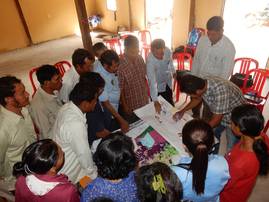
Chan Thel, his wife and six children live in Anlong Kranh Village, an extremely remote area of Kampong Thom province, Cambodia. Without major industry nearby employment opportunities are limited, leaving villagers solely dependent on their smallholder farming outputs and forest products.
With so few opportunities outside agriculture, most livelihood options in Anlong Kranh are highly exposed to the unpredictable weather patterns and an increasingly hazardous changing climate. These growing threats mean that Mr Thel’s, and many similar farming families’ livelihoods are at greater risk than ever before; and since the whole of Cambodia is highly vulnerable to climate change as well as having the lowest climate change adaptation capacity in South East Asia, the challenges Mr Thel's faces are echo far and wide across the country.
WSMC is the Backbone of Participatory Integrated Micro-Watershed Management
Back in 2016, Mr Thel was selected to be a member of FAO’s Life and Nature Project-supported “Watershed Management Committee (WSMC)”. Together with more than 20 local members, including commune chief and councilors, village chiefs, and community representatives, the group is the first committee of its kind to be established in Cambodia. The members, consisting of at least 40% women, are provided with trainings to raise their knowledge and improve their capacity to lead and facilitate the implementation of the micro-watershed management approach- a promising method to aid natural resource restoration and enhance the functionality of ecosystem services.
Through FAO’s Life and Nature project, in cooperation with the Ministry of Environment (MoE) at the national level and the Provincial Department of Environments (PDEs) at sub-national level, Mr. Thel was able to learn the fundamental concepts of micro-watershed management, water resource management, and ecosystem health promotion through various trainings, exchange visits, and the implementation of the Watershed Management Action Plan. Thanks to funding provided by the Global Environmental Facility (GEF), the Life and Nature project has been able to partner with MoE and other implementing partners to offer these trainings, set up and support the implementation of crucial action plans, and in doing so, strengthen communities adaptive and resilience capacity and improve the life of thousands of smallholder farmers.
Sustaining Watershed Ecosystems to Attain Food Security
For Mr. Thel and many other villagers like him, farming is a key determinant of their ability to attain sufficient food and nutrition security; a status that can only be achieved in conjunction with a well functioning ecosystem, healthy catchments and a protected natural environment. Climate change places additional pressures on farming systems, exacerbating existing challenges and undermining business-as usual food security improvement efforts.
Responding to the challenge, the micro-watershed approach implemented here allows for the better and more integrated management of catchment ecosystems, and in turn, a more sustainable, food secure future. In addition to supporting WSMC establishment and capacity building, FAO’s LNP, in close collaboration with MoE/PDE, has provided both technical and financial assistance to restore degraded landscapes since the project started in 2015. The assistance includes both in-stream and on-slope interventions.
In Popok commune, to October 2018, the project has supported:
· In-stream interventions: 5 cascades of check dams and 1 water retention structure (Stone Masonry) along Ou Chaom PhaOng were constructed with a total of 25 beneficiary households.
· In-slope interventions: 27.39 ha of degraded forest with 26,121 seedlings, 0.60 ha of riparian forest with 150 seedlings, and 3 ha of wood lot with 1600 seedlings were restored and planted; Other main interventions including support of CPA/CF establishment, and protection of forest and environment are also parts of project’s activities in the commune.
“Once our ecosystem functions are improved, we can battle the climate change that causes unpredictable natural disaster like storm, flood, or drought.”
In his own words, Mr. Thel described what he has understood from the various trainings and activities he has been participated in:
“We started with constructing cascade check-dams for water retention along the selected streams. With these dams, water is stored, and water flow velocity is reduced, encouraging groundwater recharge. Additionally, the local commitment to sustainable, participatory forest management has been shown through the tree planting activity -a crucial part of our degraded forest and landscape restoration. It contributes to improvement of groundwater recharge, forest and landscape health and cover, and soil quality all of which benefits our farms. We will also have a good environment. Once our ecosystem functions are improved, we can battle climate change that is causing unpredictable natural disasters like storms, floods, or drought.”
